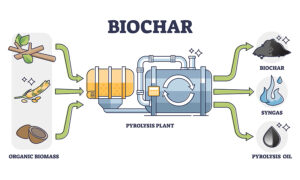The systems will convert agricultural waste into biochar, a carbon-negative product that improves soil health, captures carbon, and creates new revenue streams for farmers. The first fully permitted unit is scheduled to enter commissioning in the first quarter of 2026 on a farm north of Regina, kicking off a wider rollout across the province.
Once operational, the network is expected to process thousands of tonnes of crop residues, including flax, hemp, corn, and wheat, while generating renewable energy to support potential greenhouse projects and community food security initiatives.
Carbon Smart Farms is collaborating with Cowessess Ventures Ltd., drawing on more than 1,000 years of Indigenous knowledge in using char to regenerate soils naturally. The resulting biochar will be marketed under the Indigenous brand “Awasis”, meaning “little child.”
“I believe this initiative and partnership will be the first of its kind in Canada and underpins our guiding principles of stewardship and regeneration of the lands we all rely on for sustenance, food security, nutrition, and well-being,” said Jake Sinclair, CEO of Cowessess Ventures Ltd.
“By combining our on-the-ground farming expertise with Assured Renewables’ proven technology, we’re building a model that turns agricultural waste into long-term value for farmers and the environment,” said Tim Dufour, CEO of Carbon Smart Farms.
A spokesperson for Assured Renewables Canada added: “This partnership shows what’s possible when agriculture and clean technology align. Together, we’re helping Saskatchewan farmers access new revenue streams while supporting Canada’s climate commitments.”
























